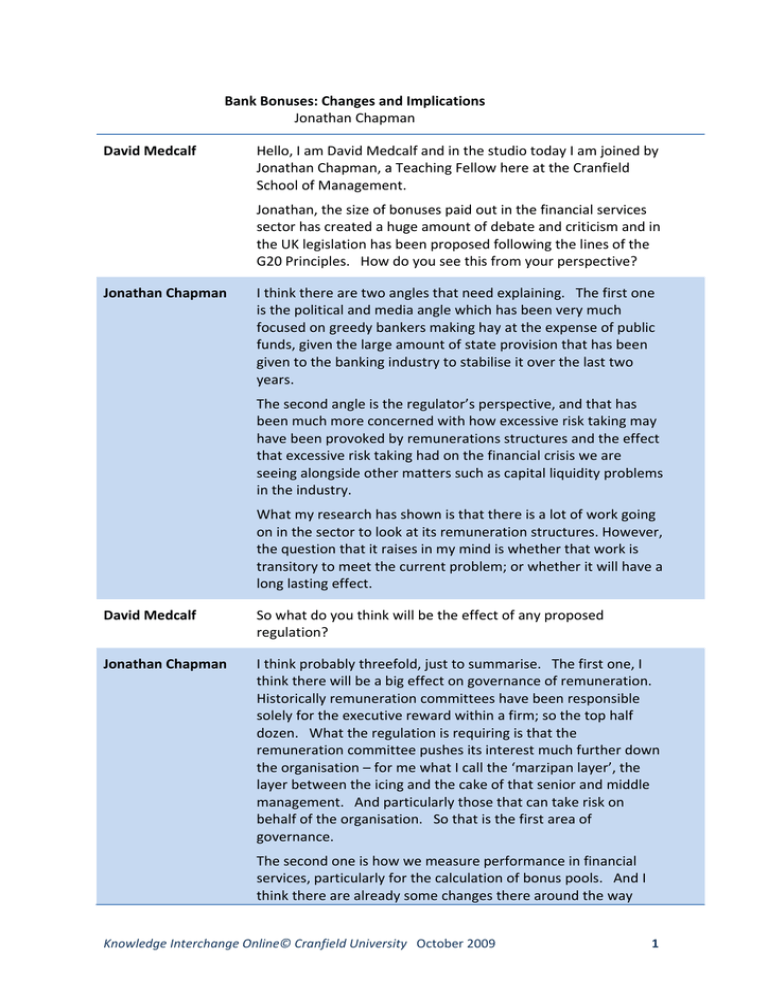Bank Bonuses: Changes and Implications David Medcalf Jonathan Chapman Hello, I am David Medcalf and in the studio today I am joined by
advertisement

Bank Bonuses: Changes and Implications Jonathan Chapman David Medcalf Hello, I am David Medcalf and in the studio today I am joined by Jonathan Chapman, a Teaching Fellow here at the Cranfield School of Management. Jonathan, the size of bonuses paid out in the financial services sector has created a huge amount of debate and criticism and in the UK legislation has been proposed following the lines of the G20 Principles. How do you see this from your perspective? Jonathan Chapman I think there are two angles that need explaining. The first one is the political and media angle which has been very much focused on greedy bankers making hay at the expense of public funds, given the large amount of state provision that has been given to the banking industry to stabilise it over the last two years. The second angle is the regulator’s perspective, and that has been much more concerned with how excessive risk taking may have been provoked by remunerations structures and the effect that excessive risk taking had on the financial crisis we are seeing alongside other matters such as capital liquidity problems in the industry. What my research has shown is that there is a lot of work going on in the sector to look at its remuneration structures. However, the question that it raises in my mind is whether that work is transitory to meet the current problem; or whether it will have a long lasting effect. David Medcalf So what do you think will be the effect of any proposed regulation? Jonathan Chapman I think probably threefold, just to summarise. The first one, I think there will be a big effect on governance of remuneration. Historically remuneration committees have been responsible solely for the executive reward within a firm; so the top half dozen. What the regulation is requiring is that the remuneration committee pushes its interest much further down the organisation – for me what I call the ‘marzipan layer’, the layer between the icing and the cake of that senior and middle management. And particularly those that can take risk on behalf of the organisation. So that is the first area of governance. The second one is how we measure performance in financial services, particularly for the calculation of bonus pools. And I think there are already some changes there around the way Knowledge Interchange Online© Cranfield University October 2009 1 Jonathan Chapman firms look at mark to market profits in particular and how conservative they are on that valuation and how much of that goes into bonus pools. Secondly, how they adjust for risk in the profits that are made, to make sure that somebody who is taking large amounts of risk for the organisation that that is adjusted for in their bonus, compared to say somebody who is taking less and earning an equivalent profit. And the final area around the performance measurement is much more behavioural measurement. So, yes the balanced scorecard has been around for a long time in financial services and a number of firms use it, but what I think we will see is a much more considered use of the non financial metrics – particularly compliance and adherence with things like risk and sales limits on behalf of the individuals taking risk for the organisation. And the cult of the star trader whose profit would override maybe those behavioural problems I think will be reduced, if not come to an end in the sector. David Medcalf So how do you award a bonus which doesn’t encourage risk taking? Jonathan Chapman I think firms are looking at what is called the pay mix, the reward mix that they offer and the balance between the fixed amount – so the base pay that people get for doing their job – and then the variable pay which certainly in theory should be related to the performance they bring. And firms are rebalancing that amount to give higher proportions of salary in that base and fixed amount, and potentially lower amounts in the variable pay. So there is an adjustment there to delink a little bit the pay to the risk taking behaviour. The other one is, as I said, around this behavioural measurement; to make sure the performance is measured on a wider basis and not just bottom line profit, so that longer term sustainability of the business for the firm and the longer term profitability of the firm is considered. David Medcalf Is there likely to be any knock on effect to other sectors? Jonathan Chapman I think potentially, it depends how firmly engrained we will see it in financial services. But certainly, for example, the Financial Reporting Council is doing some work on the combined code, which applies to all firms – or a lot of firms – outside of the financial services industry and has remuneration provisions in there and they are examining. Secondly, boards and remuneration committee members are linked through their provisions, both for being board members © Cranfield University October 2009 2 Jonathan Chapman of financial services firms, but also non financial services firms. So practice gets to spread that way as well. And finally, institutional behaviour is very strong in the reward practice in terms of benchmarking is prevalent, as is industry conferences of reward professionals learning about each others’ practice and consultants advising. So that spreads practice across sectors. And I can think of examples where we might see this. On the issue of deferred bonuses, which is very topical in financial services at the moment where bonuses will be deferred three, five years to make sure that profit is sustainable. And also the issue of clawback which is being discussed, albeit clawback of bonuses already paid certainly has practical and legal difficulties with it in the future. David Medcalf Jonathan, thank you for joining us today to talk about what is a bone of contention and will undoubtedly continue to be a bone of contention and we look forward to hearing some more from you in the future as this develops. Thank you very much. Jonathan Chapman Thank you. © Cranfield University October 2009 3





